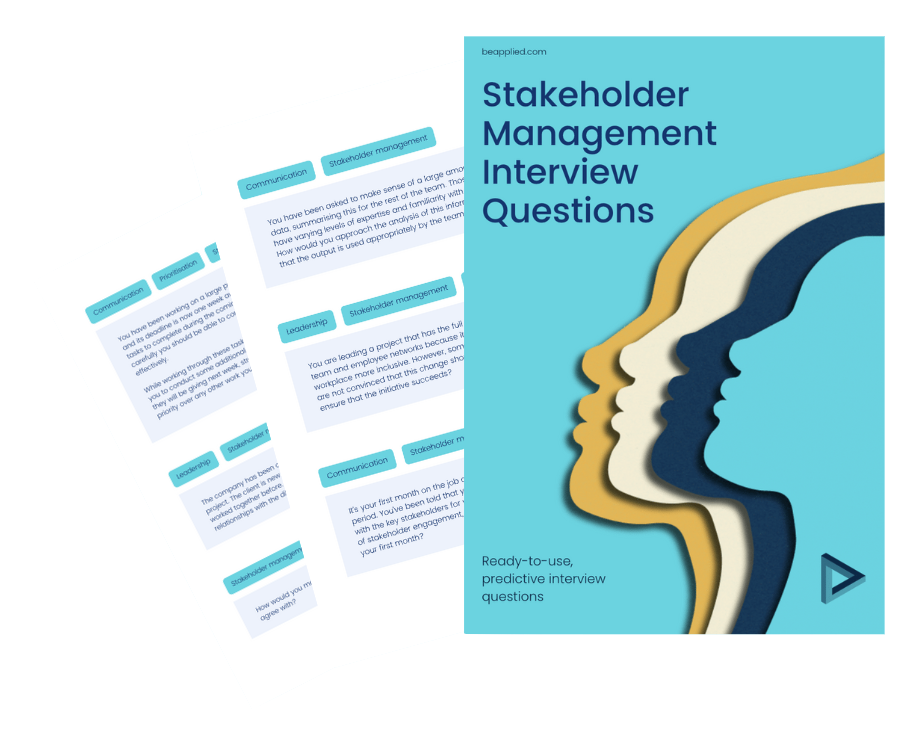Stakeholder Management Interview Questions

About this skill
Stakeholder management is an essential to component of any successful project, programme or activity. A stakeholder could be any individual, group or organisation that can impact or be impacted by a given project.
Stakeholder management is the process of getting and keeping stakeholders on board with whatever work your organisation is doing.
Roles that require stakeholder management skills
- Project management
- Consulting
- Client realtions
- Customer engagement
- Partnerships management
- Account management
What skills should you be looking for?
You have been working on a large project for the past few months and its deadline is now one week away. You have several other small tasks to complete during the coming week, but if you plan your time carefully you should be able to complete each of your current tasks effectively.
While working through these tasks, your manager unexpectedly asks you to conduct some additional research for a critical presentation they will be giving next week, stressing that this should now take priority over any other work you have. How do you respond?
The company has been commissioned to deliver a large-scale project. The client is new and the internal project team have never worked together before. How would you approach building relationships with the different stakeholders involved in the project?
Your organisation is experiencing a growth period, resulting in big changes to the working processes that people use in their roles. Members of the team are worried about the new processes and have expressed concern about the changes. How would you approach communicating with the team?
In a situation where three senior stakeholders are looking to have their request prioritised, but only one can be progressed, how do you communicate with them to get an outcome that all three are satisfied with? Please provide an example of where you have achieved this?
You have been asked to clean and combine a large amount of data from multiple sources into a single database that will be used across different departments in the organisation. The data will be used by a variety of people with very different levels of expertise and senior leadership would like to ensure that everyone is able to use the database without too much additional support. How would you approach this task?
What are structured interview questions?
Structured questions (or work samples) are highly predictive, job-specific questions designed to simulate parts of a job.
Structured work sample questions are the most predictive form of assessment you can use. Why? Because they directly test for skills by asking candidates to think as if they were already in the job.
Diversity
Testing for skills instead of just experience makes interviews a more inclusive process. 60%+ of candidates hired through our process would've been missed using CVs/traditional interviews - most of whom are from underrepresented groups.
Accuracy
By simulating tasks that would realistically occur in the role, you can see how candidates would think and work should they get the job.What could be more predictive than having candidates do small parts of the job before actually getting it?
Candidate experience
Candidates genuinely enjoy being given a chance to showcase their ability - this is why we have a 9/10 average candidate experience rating (including unsuccessful candidates).

Decide on the skills you’re looking for
Choose 6-8 core skills required for success in the role. These can be a mix of hard, technical skills as well as soft skills and general working characteristics.You could also include one or two of your organisation's most relevant values.
Think of scenarios that would test these skills
Next, come up with either everyday tasks or rarer, more challenging scenarios that would test some of these skills. They can be day-to-day duties, bigger projects or specific dilemmas that a candidate may realistically face. Should they get the job.
Pose scenarios hypothetically to create your questions
Instead of your typical ‘tell me a time when’ questions, ask candidates what they would do if faced with a given scenario.It's not that experience doesn't have any value… it's just more predictive to test directly for skills, without making assumptions based on background.
Give yourself scoring criteria
Want to make more data-driven hiring decisions? Score candidates against set criteria.We’d recommend starting out with a simple 1-5 star scale and a few bullet points noting what a good, mediocre and bad answer might include.

Use review panels
Having team members join your interviews will result in fairer, more accurate scores.Three is the magic number - you’ll start seeing diminishing return after that

.svg)